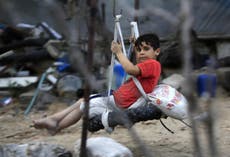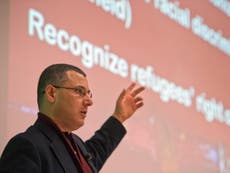A Champions League qualification match, but no players. How Israel’s permit regime throws lives into disarray
The West Bank is where Israel’s right wing is focusing its annexation ambitions, and it’s tempting to believe that the primary reason for their fear that Gazans will settle there is a demographic rather than a security one

Given the global obsession with football, it’s surprising that the cancellation of the Palestinian FA Cup final has gone virtually unnoticed abroad. For Palestinians the Fifa-recognised tournament is a big deal, not least because the winner qualifies to play in the Asian Champions League. The problem this year was that one of the teams was from the Gaza Strip.
The first leg of the final, in Gaza, between the top Gaza club Khadamat Rafah and Balata FC, based in the largest West Bank refugee camp, was a 1-1 draw. The second leg, scheduled in Nablus for 3 July, never happened because Israel granted permits to only seven of the players to leave Gaza for the West Bank.
The club applied as normal to the Israeli authorities for exit permits through the Erez crossing into Israel on behalf of a full 22 strong squad, along with 13 coaching staff and officials, to travel to Nablus for the second leg.
Jamal Mussalam, the club’s chairman, said that the total was allowed under a “global protocol” for visiting clubs. But he also explained the club always applied for more players than the minimum needed, “because if a number of passes are denied, there are alternatives that they can play”.
The club were then notified that the Israeli military’s civil affairs’ division, COGAT, had approved just four of the 35 permits – including for just one player – refusing the rest on unspecified “security grounds”. The Palestinian FA then rescheduled the match for 25 September and the club reapplied. COGAT then increased the number of permits to 12, of which only seven were players.
When the internationally respected Tel Aviv-based Israeli human rights organisation, Gisha, challenged the second decision in the Jerusalem District Court, the state’s attorney produced a confidential recommendation from the domestic intelligence agency Shin Bet (shown to the judge but not the Gisha’s lawyers or the applicants themselves), that the 23 permit denials should stand.
The court duly accepted that recommendation, as it routinely does in the vast majority of such cases. Without giving any details, Shin Bet said after the hearing that security checks had turned up information pointing to “most” of the team’s “links to terrorism”.
Since the specifics are unknown, and allowing for any genuine security concerns, it’s impossible to assess – let alone challenge – this claim or even to know what, if anything, it means. Despite COGAT’s contention that each applicant is evaluated individually, a deeply disappointed Mussalam, a football coach in Gaza for 25 years, dismissed the “flimsy” security grounds for banning so many people, and suggested the decision was “political”.
Gisha concluded that it shows how Israel “systematically violates Palestinians’ rights to freedom of movement” as part of its policy of separating Gaza from the West Bank. What can be safely said is that the Gaza closure bears down especially heavily on those seeking to leave for the West Bank. The Netanyahu government has not largely sought to stop those emigrating abroad from Gaza for good. And many already have – 35,000 in the last year according to Israeli figures.
They are escaping the dire conditions caused by 12 years of economic siege, the ever-present fear of another Israeli military onslaught. Hamas policies and, paradoxically, the very ban on free travel in and out of Gaza. Most go through the Rafah crossing into Egypt, which after years of closure is now open each weekday to a few hundred Gazans at the top of a huge waiting list.
The restrictions on travel to the West Bank are, if anything, tightening. At the Rafah crossing this September Hisham Abu Nader, a former employee of the Fatah-run PA, and his wife Saher explained how they were going to Cairo to receive radiotherapy for her breast cancer – a treatment not available in Gaza. It was going to cost them $2,000 they could ill afford instead of an alternative at less than a quarter of the cost – but that was in Hebron, just 40 minutes drive away, and a journey for which they had been refused a permit.
The cliche of Gaza as a “big prison” is reinforced by how much easier it is to make a (one way) journey into Gaza from the West Bank than the other way round.
Given that the West Bank is where Israel’s right wing is focusing its annexation ambitions, it’s tempting to believe that the primary reason for their – often misplaced – fear that Gazans will settle for good in the West Bank is a demographic rather than a security one. In other words, it may simply be to prevent avoidable increases in the West Bank Palestinian population.
A few days before the cup final hearing, I sat on the floor in the barely furnished fifth floor flat in Gaza’s Nuseirat refugee camp rented by Ayya Ayyad, 31, and her husband Abdullah, 40. They told me how she was blocked from returning to her home West Bank village of Anabta, just 80 miles away and how she hadn’t seen her parents or her sisters for seven years despite applying for permits around 15 times. Ayya has West Bank ID.
She had made repeated efforts to visit – most recently for a sister’s wedding – but had now applied to return for good. She was refused, again for unspecified “security reasons”. Ayya’s three daughters are all under seven. They have never seen their grandparents.
Coming to Gaza was the easy part. She had met Abdullah online, chatting for several months back in 2010-11. “It was a love story,” she said. It still was. She didn’t want to leave her husband but Abdullah is ill and requires surgery he can’t afford, and neither of them belong to any of the political factions who might have helped him. Their joint decision was made that his family should leave.
On 26 September Shin Bet were asked if it could explain the blocking of Ayya Ayyad’s application. At the time of writing there has been no reply.







Join our commenting forum
Join thought-provoking conversations, follow other Independent readers and see their replies